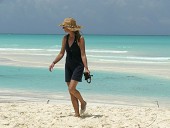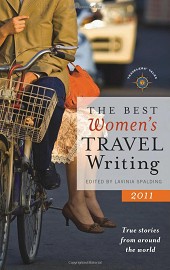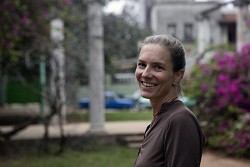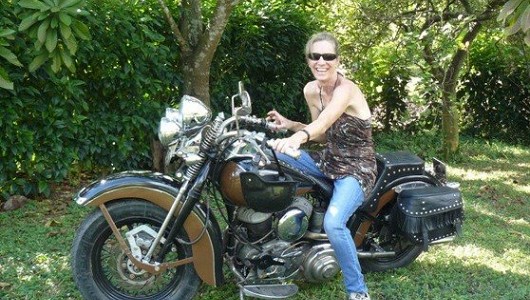A native New Yorker, Conner Gorry first went to Cuba as a volunteer in 1993 and moved to Havana permanently in 2002. A journalist, freelance writer, and guidebook author, she has written more than a dozen guides for Lonely Planet and other travel publishers and covers the Cuban health system for MEDICC Review. A privileged gig, she is the only American journalist to have lived with and reported on Cuban doctors in settings as diverse as post-disaster Pakistan and Haiti, the barrios of Caracas, and the Honduran Mosquito Coast. Her blog, Here is Havana, is continuously updated despite a laborious 48kbp dial-up connection, and in 2010, Conner launched Havana Good Time - the only travel iApp written and maintained from Cuba. She is currently finishing a book chronicling contemporary life on the island - including her own. For details of Conner’s work, including clips, see www.connergorry.com.
What’s one place that has moved you or changed you in a significant way?
one of the beauties of travel for me is that every place has the potential to change us in a significant way. Even the next town over harbors this potential - we just have to be open to it. Some destinations, however, are blatant game changers. They’re in your face: you arrive and the place gets under your skin, in your mind and heart saying: “Pay attention; this is important. Be present and conscious while exploring this land.” The Big Island of Hawaii is that place for me. Even though I’ve lived in Cuba for almost 10 years (and the place has changed me mightily - beyond recognition some might argue!), the unparalleled landscapes of the Big Island, the “mana” (spiritual energy) of the land, the heterogeneous culture, plus the rich history and traditions, and let’s face it: the remote location, seem to affect me at a molecular level somehow.
Who is the most inspiring or interesting person you’ve met on the road?
Erva Farnsworth. She was my landlady in Puna on the Big Island when I first went there in 2001 and now we’re close friends. She’s 93, goes swimming every day, went to China and Vietnam last year, cracks a great joke, and is your all-around kick-ass old lady. I want to be like her when I grow up!
Is there something you always do (or search out, buy, learn, pack, drink), whenever you’re on a trip?
One thing I never leave home without is my Sigg water bottle. The amount of plastic waste created by single-use water bottles (and travelers are mighty guilty in the production of said waste) makes my hair curl. No matter where I travel, I’m conscious to reduce my environmental and cultural footprint as much as possible. This includes not buying single-use bottles whenever practical (carrying a filter always makes it practical, by the way). on my last assignment for Lonely Planet, I researched and wrote the entire guide without buying one single-use bottle. I wrote a little about it here:http://www.lonelyplanet.com/africa/travel-tips-and-articles/76625
Do you think women and men approach travel or travel writing differently? How does being a woman affect the way you travel or experience the world?
I think gender affects travel more than people realize (or are willing to admit). Before I went on my first solo trip (to Guatemala, which was just emerging from civil war), I took a self-defense class for women. I’m not sure taking such a class would have even occurred to a guy about to embark on an extended solo trip. This class was one of the best things I ever did for myself, and I recommend it for all women - travelers or not. Covering nightlife (or for non-writers, just going out) as a solo female traveler in destinations like Guatemala City and Tegucigalpa is also challenging. I think the gender question is much more present in the minds of solo women travelers, since safety concerns can trump desire for new experiences.
In what ways does writing inform your relationship with travel? Do you keep a journal? Conduct interviews? Write on location?
Ah, the old technique question. I’ve tried many methods over the years, and I’m convinced keeping a journal or notes or writing in some form while you’re in a place is key to capturing it (not that distance in time and space doesn’t inform your understanding of a place - it does, and the two together are what make the best writing, I think). It’s one thing to write about the 52 of 3,000 types of potato you tasted in Peru from memory; it’s another thing to distil the flavors, textures, and colors of those potatoes the day you sampled six different kinds on the street. Also, writing is my main tool for trying to understand complex and new situations, cultures, and environments—and travel is full of them.
What’s on your list of future destinations?
The Big Island, hopefully, though the airfare alone makes it big-ticket travel, so it’s unlikely any time soon. While I try to make that happen, I’m cleared to return to Haiti soon to do a follow up on my coverage of the Cuban doctors there, and Guatemala is always on my list of future trips - I can’t get enough of the place, plus I have a guidebook to update!
In your opinion, what is the greatest reward of traveling?
Travel opens your mind, fosters flexibility and spontaneity, debunks myths and dispels prejudice. Also, you learn something new everyday on the road, which I cherish.












